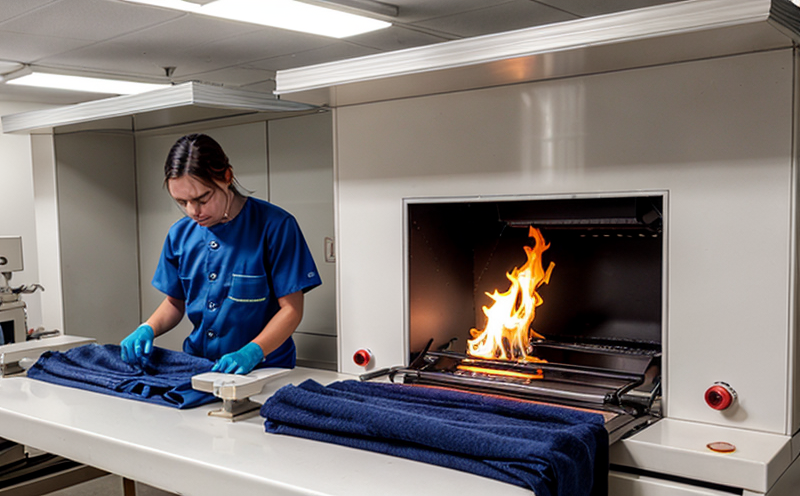Flammability Testing of Workwear
The flammability testing of workwear is a critical aspect of ensuring safety in various industrial sectors where workers are exposed to fire hazards. This testing ensures that the materials used in manufacturing garments for these environments meet strict standards designed to protect lives and minimize property damage.
Flammable materials can pose significant risks in industries such as construction, mining, oil & gas, and firefighting. In these scenarios, even minor ignition sources could lead to severe accidents if workwear does not possess adequate flame resistance properties. Therefore, understanding the specific testing methods required for different types of fabrics is essential.
At Eurolab, our comprehensive approach includes conducting tests based on international standards like ISO 13565-2 (for flash resistance) and ASTM F1930 (for radiant heat). These standards provide clear guidelines on how to prepare specimens properly before testing. Specimens are typically cut from the fabric samples provided by clients or purchased from suppliers.
The testing process involves placing these prepared fabrics into specialized equipment designed to simulate real-world conditions accurately. For instance, in flash resistance tests, a small flame is applied to one side of the fabric sample while its temperature and time-to-extinguish are measured. This data helps determine if the material can self-extinguish after removal from the heat source.
Once testing is complete, Eurolab's experienced engineers analyze all collected data against relevant standards. They then compile detailed reports providing insights into which materials perform best under specified conditions. These reports not only help manufacturers improve their products but also assist purchasers in making informed decisions about the safety of garments they intend to use.
By adhering strictly to international norms, Eurolab ensures that every test conducted is reliable and repeatable. Our facilities are equipped with state-of-the-art instruments capable of replicating various environmental factors affecting material behavior during combustion. This precision guarantees accurate results that can be trusted by both clients and regulatory bodies.
In summary, flammability testing plays a crucial role in safeguarding workers' lives across multiple industries. By leveraging advanced techniques and adhering to stringent criteria set forth by recognized organizations worldwide, Eurolab offers unparalleled expertise in this field. Clients benefit from our ability to deliver precise measurements and actionable recommendations that enhance product safety standards.
Why It Matters
The importance of flammability testing cannot be overstated when it comes to workwear used in high-risk environments. Properly conducted tests ensure that the materials selected for manufacturing such garments meet necessary performance requirements, thereby reducing potential risks associated with fire exposure.
In many cases, standard compliance alone may not suffice; additional measures must be taken based on specific job roles and locations where workers operate. For example, firefighters require clothing that can withstand intense heat without catching alight easily. Similarly, oil rig operators need protection against sparks from machinery nearby. Therefore, understanding the unique challenges faced by different occupational groups is vital for selecting appropriate fabrics.
Moreover, failing to conduct thorough flammability assessments could lead to non-compliance issues with local regulations or voluntary industry codes. Non-conforming products might result in legal penalties and damage to brand reputation. To avoid these pitfalls, organizations should prioritize investing in reliable laboratories like Eurolab that specialize in this area.
Furthermore, incorporating feedback from end users through continuous improvement practices ensures ongoing adaptation of materials to changing needs. Regular retesting helps maintain consistent quality levels over time as fabric compositions evolve due to technological advancements or supply chain considerations.
In conclusion, prioritizing flammability testing demonstrates a commitment to worker safety and compliance with relevant legal frameworks. It also fosters innovation within the industry by encouraging the development of safer materials capable of meeting increasingly stringent requirements.
Eurolab Advantages
At Eurolab, we pride ourselves on offering unmatched expertise in conducting flame resistance testing for workwear across diverse industries. Our team comprises highly qualified professionals who possess extensive experience in this field, ensuring accurate and reliable results every time.
We employ cutting-edge technology to perform tests according to recognized international standards such as ISO 13565-2 and ASTM F1930. This ensures consistency and reproducibility of our findings, which are crucial for achieving meaningful insights into material performance.
Our state-of-the-art facilities cater specifically to the needs of those involved in textile & apparel manufacturing. From initial consultation through final report delivery, we provide comprehensive support tailored to each client's unique requirements.
In addition to technical proficiency, Eurolab places great emphasis on fostering strong relationships with our clients. By maintaining open lines of communication throughout all stages of testing, we ensure that feedback is incorporated promptly and effectively into ongoing projects.
Finally, Eurolab stands out by offering not just laboratory services but also consulting advice regarding best practices for selecting suitable fabrics based on end-user requirements. Our goal is to help clients achieve optimal outcomes while minimizing costs associated with non-compliance or suboptimal choices.
Use Cases and Application Examples
In the construction industry, workers often face hazardous situations where sparks from welding equipment can ignite their clothing quickly. To address this challenge, Eurolab has tested various synthetic blends used in protective vests and coveralls to ensure they meet stringent flame resistance standards.
The oil & gas sector presents another set of challenges related to flammability risks due to the presence of volatile hydrocarbons present at drilling sites or refineries. Here again, our tests have helped identify which materials offer superior protection against sudden ignition events.
For firefighters, personal protective equipment (PPE) must provide exceptional flame resistance alongside other critical properties like durability and comfort. Eurolab's expertise has contributed significantly to the design of next-generation firefighting garments that balance these competing demands effectively.
In summary, whether you're dealing with industrial hazards or specialized roles demanding extra protection against fire, Eurolab provides the necessary tools and knowledge required to make informed decisions about material selection for workwear applications.





